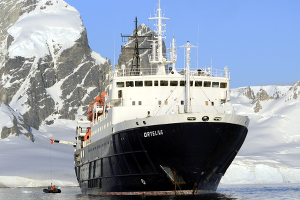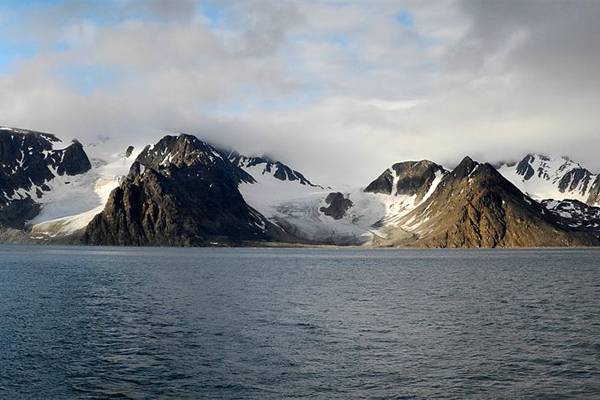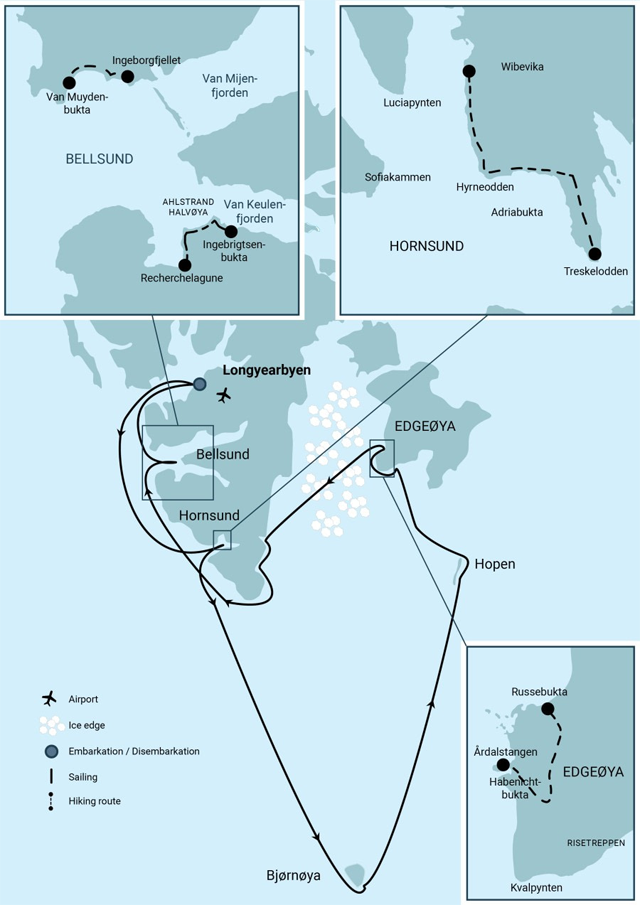DATES / RATES
Rates are listed per person in USD. Promotional offers are not reflected in the rates below.
|
| Start Date | End Date | Starting from | 0 | 0 | 0 | 0 | 0 |
|---|
| Jun 18, 2026 | Jun 30, 2026 | 8,799 | N/A | N/A | N/A | N/A | N/A |
Rates are listed per person in USD. Promotional offers are not reflected in the rates below.
|
| Start Date | End Date | (Starting from)
Starting from | (Mid-range)
0 | (High-end)
0 |
|---|
| Jun 18, 2026 | Jun 30, 2026 | 8,799 | N/A | N/A |
ITINERARY
Day
1: Largest town, biggest island
You
touch down in Longyearbyen, the administrative center of Spitsbergen,
the largest island of the Svalbard archipelago. Enjoy strolling around
this former mining town, whose parish church and Svalbard Museum make
for fascinating attractions. Though the countryside appears stark, more
than a hundred species of plant have been recorded in it. In the early
evening the ship sails out of Isfjorden, where you might spot the first
minke whale of your voyage.
Day
2: Kongsfjorden and Blomstrandhalvøya
On
the first day of our activity program, we will slowly ease into things.
Blomstrandhalvøya is located on the northern side of the
fjord, which will offer shelter and room to change plan in case the
weather changes. In the afternoon, you visit Ny Ålesund, one
of the northernmost settlements on Earth. Once a mining village served
by the world’s most northerly railway – you can
still see its tracks – Ny Ålesund is now a research
center.
Close
to the community is a breeding ground for barnacle geese, pink-footed
geese, and Arctic terns. And if you’re interested in the
history of Arctic exploration, visit the anchoring mast used by polar
explorers Amundsen and Nobile in their airships, Norge (1926) and
Italia (1928). In the evening, we head north along the west coast and
spend the night in the sheltered surroundings of Krossfjorden.
Day
3: Exploring the North West
Next
to our activities, we will next head toward Amsterdamoya, where you
have the chance to hike past the remains of a 17th-century whaling
station. You can also enjoy the beautiful panorama of Smeerenburgsleta.
In the afternoon, we make for the islands around Fair Haven.
Day
4: Rugged Raudfjorden
At
Raudfjorden, on the north coast of Spitsbergen, you can take in an
expansive fjord spilling with glaciers – and maybe even
visited by ringed and bearded seals. The cliffs and shoreline of this
fjord also support thriving seabird colonies, rich vegetation, and the
possibility of polar bears. Here we will find the right balance between
safe activities and wildlilfe watching.
Day
5: The stunning sights of Liefdefjorden
Depending
on the weather, you could sail into Liefdefjorden and cruise within
sight of the 5-kilometer-long (3.1 miles) face of Monaco Glacier. The
waters in front of this glacier are a favorite feeding spot for
thousands of kittiwakes, and the base of the ice is a popular polar
bear hunting ground. If ice conditions prevent sailing here early in
the season, we may use an alternate route along the west coast of
Spitsbergen. Near the area of Texas Bar and Hornbaekpollen, there are
also some great hikes.
Day
6: North Spitsbergen splendors
This
is our reserve day for activities around North Spitsbergen. Weather and
wildlife permitting, we will choose the right location for another day
of splendid outdoor adventures.
Day
7: Forlandsundet or St. Johns Fjord
Forlandsundet,
between the main island of Spitsbergen and the narrow Prins Karls
Forland, is a place of great beauty and fascinating wildlife. Walruses
sometimes haul out here, and seabirds can be found around Fuglehuken.
You may also see walrus populations around Sarstangen and Poolepynten.
Alternatively, we might sail into St. Johns Fjord or south to the mouth
of Isfjorden, landing at Alkhornet. Seabirds nest on these cliffs,
Arctic foxes search below for fallen eggs and chicks, and reindeer
graze the sparse vegetation. We will arrive in Longyearbyen later that
night.
Day
8: There and back again
Every
adventure, no matter how grand, must eventually come to an end. You
disembark in Longyearbyen, taking home memories that will accompany you
wherever your next adventure lies.
Day
1: Largest town, biggest island
You
touch down in Longyearbyen, the administrative center of Spitsbergen,
the largest island of the Svalbard archipelago. Enjoy strolling around
this former mining town, whose parish church and Svalbard Museum make
for fascinating attractions. Though the countryside appears stark, more
than a hundred species of plant have been recorded in it. In the early
evening, the ship sails out of Isfjorden, where we might spot the first
minke whale of the voyage.
Day
2: Spectacular Hornsund
We
start the day by quietly cruising the side fjords of the spectacular
Hornsund area in southern Spitsbergen, enjoying the scenery of towering
mountain peaks. The mountain of Hornsundtind rises to 1,431 meters
(4,695 feet), while the peak of Bautaen testifies to why early Dutch
explorers gave this island the name Spitsbergen, meaning
“pointed mountains.” There are 14 magnificent
glaciers in the area, and we have a fair chance of encountering seals
and polar bears. The nearby cliffs of Sofiakammen are also home to
thousands of pairs of nesting kittiwakes and little auks, and in the
evening, we might see thousands of harp seals rutting on ice floes at
Sørkapp.
Day
3: The seabird colonies of Bear Island
We
arrive at the southeastern end of Bear Island, a great place for
viewing large seabird colonies. The nearby nesting cliffs are part of
an extensive nature reserve where large ships are not allowed to bring
passengers on shore. Afterward we’ll sail northeast into
Sorhamna, where we can get closer to the seabird cliffs. Chiefly
Brünnichs guillemots, kittiwakes, and fulmars nest here.
Just
north of this, in Kvalrossbukta, we will land and see the remains of a
whaling station from early in the previous century. We might also make
a landing in a shallow valley, such as Rendalen, and look for (at a
safe distance) great skuas, large seabirds known to be fiercely
territorial. As we continue north along the east side of Bear Island,
we may still encounter dazzling shoals of drift ice.
Day
4: Rarely visited Hopen Island
On
the way to Hopen, we may encounter sea ice with rutting harp seals. We
land at the southern end of Hopen Island, at Koefoetodden, where you
can see the remains of 17th-century whaling sites. Through nearby
Bekkeskaret is an easy route to Kvasstoppen (190 meters, 620 feet) and
the remains of a plane from World War II. Hopen Radio station is the
most remote manned weather station in all of Svalbard.
Day
5: Along and through the pack ice
We
may still encounter heavy sea ice in the Barentsz Current, where we
have a good chance of spotting polar bears as well as various species
of seal and seabird.
Day
6: Kittiwakes, canyons, and south Edgeøya
Sailing
along the western side of the Tusenöyane (where
we’re not allowed to land in summer), we may see polar bears
and walruses as we approach Risetreppen. This beautiful canyon features
an accessible kittiwake colony, and during our walk we may encounter
reindeer on the lush tundra.
Day
7: Pomor trappers at Russebukta
Today
we go to shore at Ardalstangen, a ruggedly scenic area with lakes and
different species of waterfowl. Later in nearby Habenichtbukta, we can
look from some distance to a wintering site of 18th-century Pomor
trappers, who often stayed for years in the same place. Later in the
afternoon, we aim to land at the south side of Russebukta, near a
tundra with reindeer and great walking opportunities.
Day
8: Guillemot colony and south Spitsbergen
Our
goal for the first part of the day is a landing at the mountain of
Stellingfjellet, near the largest colony of
Brünnich’s guillemots in Spitsbergen. Later on we
will make landings at the rarely visited coast of south Spitsbergen, at
the bay of Isbukta.
Day
9: Bell Sund’s flora, fauna, and haunting history
We
continue our voyage in Bell Sund, one of the largest fjord systems in
Svalbard. The ocean currents make this area slightly warmer than other
areas in Spitsbergen.
Day
10: There and back again
Even
the greatest journeys must eventually come to an end. We disembark
today in Longyearbyen, taking home memories that will accompany us
wherever the next adventure lies.
Ortelius (Expedition, 108-guests)
Ortelius offers a comfortable hotel standard, with a u-shaped, a bar and a lecture room. Our voyages are primarily developed to offer our passengers a quality exploratory wildlife program, trying to spend as much time ashore as possible. As the number of passengers is limited to approximately 116 on the Ortelius, flexibility assures maximum wildlife opportunities. Ortelius carries 10 zodiacs
 (Click image to view Ship details)
(Click image to view Ship details)
WHAT'S INCLUDED
- Voyage
aboard the indicated vessel as indicated in the itinerary
- All
meals throughout the voyage aboard the ship including snacks, coffee
and tea.
- All
shore excursions and activities throughout the voyage by Zodiac.
- Program
of lectures by noted naturalists and leadership by experienced
expedition staff.
- Free
use of rubber boots and snowshoes.
- Transfers
and baggage handling between the airport, hotels and ship only for
those passengers on the group flights to and from Longyearbyen.
- All
miscellaneous service taxes and port charges throughout the programme.
- AECO
fees and governmental taxes.
- Comprehensive
pre-departure material.
- Free 1.5 GB of Wifi
Excluded
from this voyage
- Any
airfare, whether on scheduled or charter flights
- Pre-
and post- land arrangements.
- Transfers
to / from the vessel outside Spitsbergen.
- Passport
and visa expenses.
- Government
arrival and departure taxes.
- Meals
ashore.
- Baggage,
cancellation and personal insurance (which is strongly recommended).
- Excess
baggage charges and all items of a personal nature such as laundry,
bar, beverage charges and telecommunication charges.
- The
customary gratuity at the end of the voyages for stewards and other
service personnel aboard (guidelines will be provided).
ADVENTURE
OPTIONS
- Kayaking
- Diving
- Hiking
- Cleaning
the shores
- Photo
Workshop




